
The Sacrament of Holy Matrimony
The beautiful union between man and woman which reflects the loving union of Christ with his Church.
If you are interested in getting married at St. Anthony, contact the pastor.
The Pastor will explain what is involved in getting married in the Church. Call the parish at 503 771-6039.
Some Initial FAQ's
The Church values marriage very highly and takes marriage very seriously. It is the foundation of the family–the crucial environment for human development. It is where we learn about right relationship, love and forgiveness. It is where we begin to build a world-view and where we first form our relationship with God.
Making a promise to be faithful to a spouse for the rest of one’s life is not something to be taken lightly. It is something to be discerned carefully with help from others and prayer. Consequently, the Church recommends that a couple take the time to reflect on their relationship, their compatibility, their goals and aspirations, their views on key aspects of marriage and more. There are resources that parishes have that can help the couple to do this discernment: Marriage programs, meetings with the pastor, classes, meeting with older mentor married couples, retreats for engaged couples and more. Usually the process takes about 6 months or more.
Resources for Marriage
Click here for some resources on the Archdiocesan Website.
Explanation of the Sacrament of Holy Matrimony
Below is a simple outline that can navigate you to one of the five sections.
Marriage in God’s Plan
- Marriage in the Order of Creation:
- God himself is the author of marriage. Marriage is not a purely human institution.
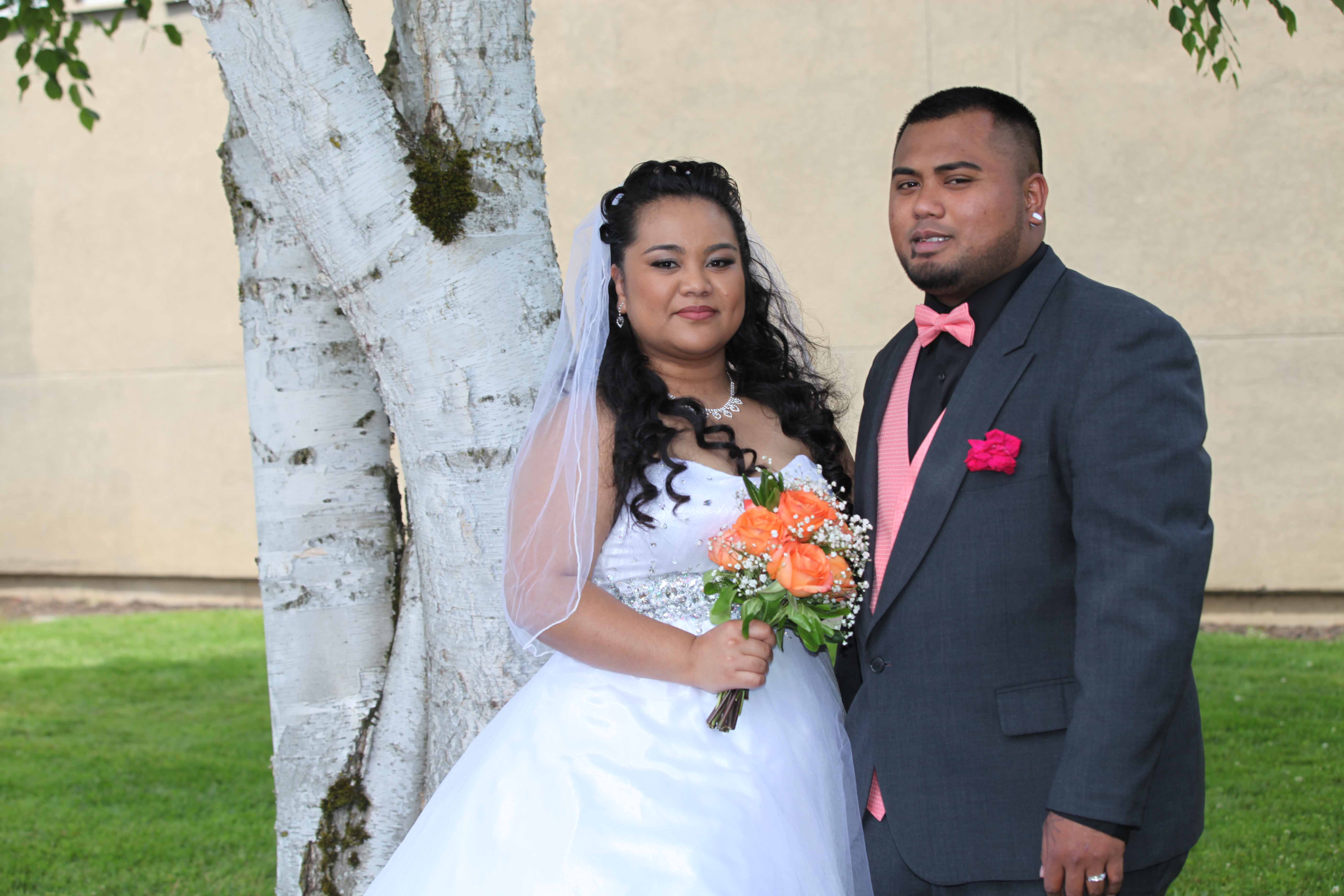
- Despite the many variations it might have undergone in various cultures, most would agree that, “The well-being of the individual person and of both human and Christian society is closely bound up with the healthy state of conjugal and family life” (CCC 1603).
- God created humanity in God’s image and likeness, who is love. Since God created humanity male and female, the mutual love between the man and woman is an icon of God’s absolute and unbreakable love for us.
- God himself is the author of marriage. Marriage is not a purely human institution.
- Marriage Under the Regime of Sin:
- Because of sin, “the union of man and woman has always been threatened by discord, a spirit of domination, infidelity, jealousy, and conflicts that can escalate into hatred and separation” (CCC 1606).
- Thus, they need God’s grace to “achieve the union of their lives for which God created them ‘in the beginning’” (CCC 1608).
- Marriage Under the Pedagogy of the Law:
- In Genesis, the consequences for sin are meant to limit the damages due to sin and help the couple to move toward what God intended for their relationship.
- In the Old Testament times, the belief in the unity and indissolubility of marriage begins to take shape.
- God’s faithful and exclusive relationship with his people stands as an example of what marriage should be.
- In Genesis, the consequences for sin are meant to limit the damages due to sin and help the couple to move toward what God intended for their relationship.
- Marriage in the Lord:
- When Jesus comes, he clarifies what God wants from marriage.
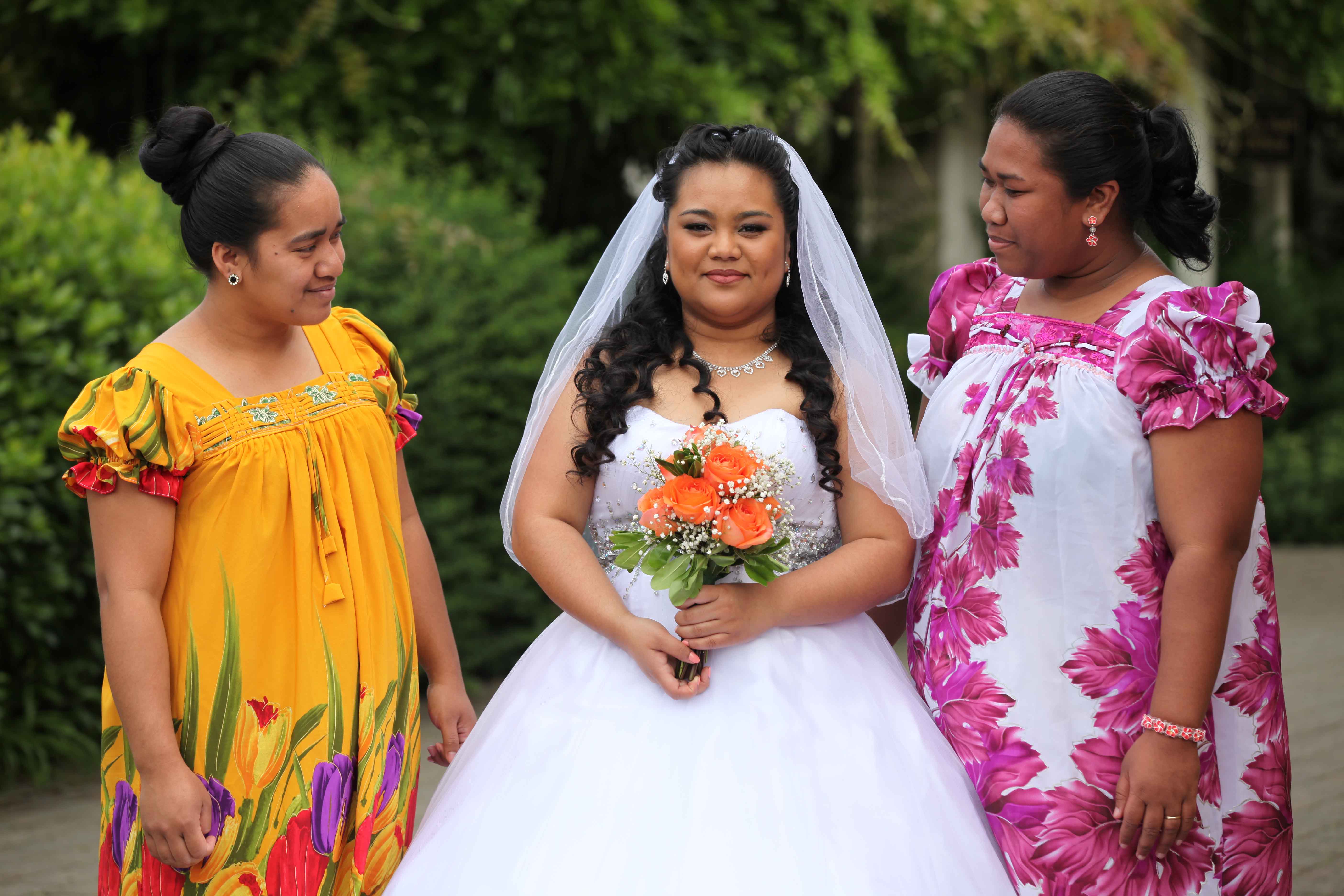
- “By coming to restore the original order of creation disturbed by sin, Jesus himself gives the strength and grace to live marriage in the new dimension of the Reign of God. It is by following Christ, renouncing themselves, and taking up their crosses that spouses will be able to “receive” the original meaning of marriage and live it with the help of Christ” (CCC 1615).
- When Jesus comes, he clarifies what God wants from marriage.
- Virginity for the Sake of the Kingdom:
- There are some disciples that Jesus calls to renounce the great good of marriage in order to:
- Be free to follow Jesus wherever he leads.
- Give their whole heart to him.
- Both marriage and virginity are vocations that reinforce one another and lead to Christ:
- Virginity reminds the married that the bond with Jesus supersedes all other bonds, familial or social and that there will be no marriage in heaven.
- Marriage reminds the virgins that our life is meant to be lived as a sacrifice of love for others and not turned in on itself.
- There are some disciples that Jesus calls to renounce the great good of marriage in order to:
The Celebration of Marriage
- The celebration of marriage between two Catholic faithful normally takes place during Holy Mass, because:
- The Grace of all the Sacraments flows from the death and resurrection of Jesus—the Paschal Mystery—which is what is commemorated at the Mass.
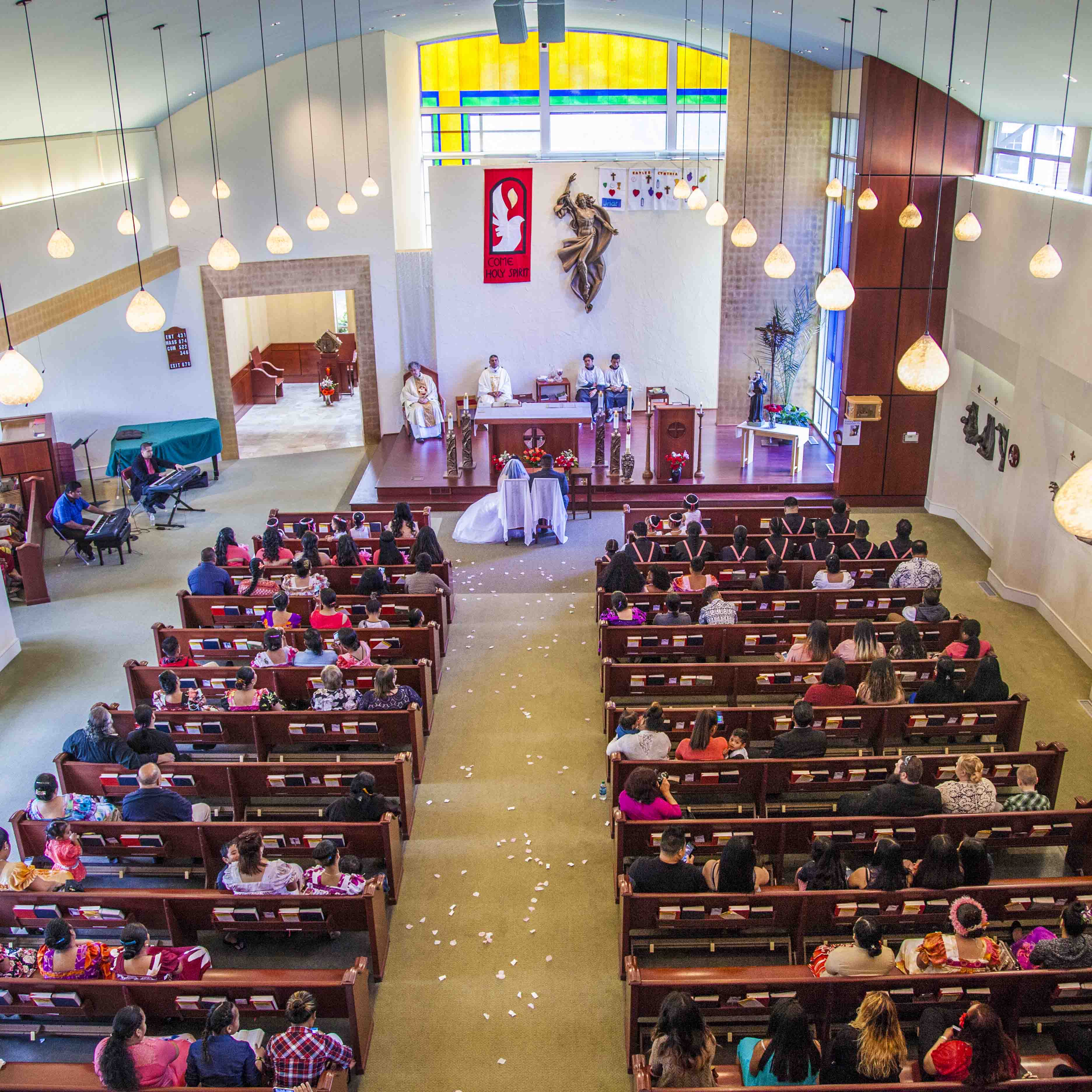
- The Eucharist is the realization of the New Covenant “in which Christ has united himself for ever to the Church, his beloved bride for whom he gave himself up” (CCC 1621). The Eucharist is the manifestation of the marriage of Christ to his bride, the Church.
- Thus, “it is therefore fitting that the spouses should seal their consent to give themselves to each other through the offering of their own lives by uniting it to the offering of Christ for his Church made present in the Eucharistic sacrifice…” (CCC 1621).
- Also, “by receiving the Eucharist so that, communicating in the same Body and the same Blood of Christ, they may form but “one body” in Christ” (CCC 1621).
- During the Mass there is a prayer over the couple, an Epiclesis. It is a calling forth of the grace of the Holy Spirit to strengthen the couple to love as Christ loves.
- The Grace of all the Sacraments flows from the death and resurrection of Jesus—the Paschal Mystery—which is what is commemorated at the Mass.
Matrimonial Consent
- The requirements for a valid Catholic marriage are as follows:
- They are a baptized man and woman.
- The spouses are free to marry. They are not forced. Also, they are not prevented from marrying through any natural or church law.
- They freely exchange their consent. This is what makes the marriage. The minister does not confer the sacrament on the couple. They confer the sacrament on each other with their vows to one another. If they are forced to give their consent, it is not a valid marriage.
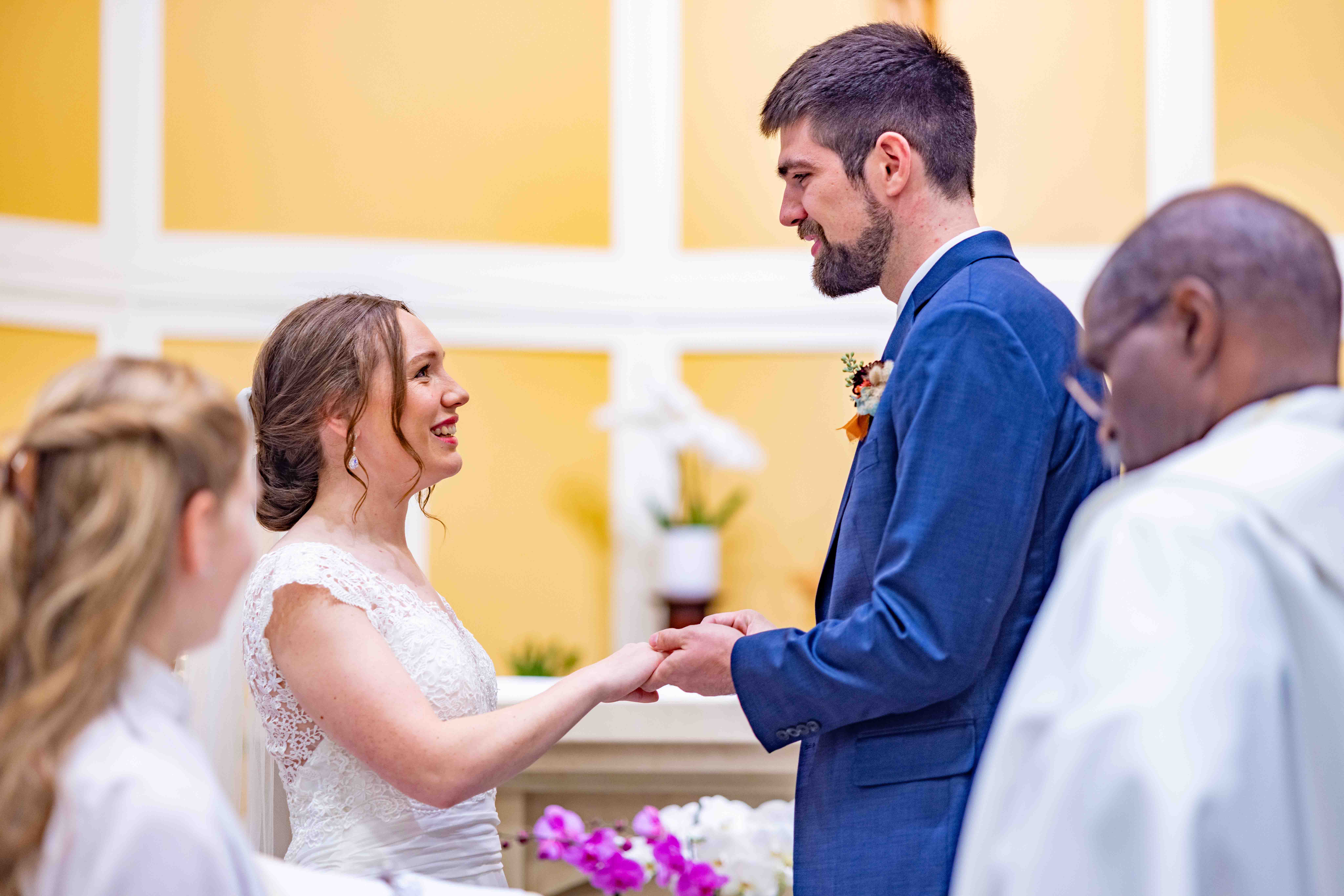
- The couple has the intention to marry for life, to be faithful to one another.
- The couple has the intention to be open to children.
- Their consent is given in the presence of two witnesses and before a properly authorized church minister. The public consent helps to protect the “I do” of the spouses.
- Mixed Marriages and the Disparity of Cult: These do not present insurmountable obstacles but can lead to challenges in the marriage.
- Mixed Marriage: This is a marriage between a Catholic and a Christian of a different denomination.
- The couple can grow together and share what each denomination has in common. But, in the marriage they might also feel the tension of the disunity of the Churches.
- A mixed marriage requires the express permission of church authority.
- Disparity of Cult: This is a marriage between a Catholic and an unbaptized person.
- There are challenges that can come in this situation: whether to raise the children in the faith, differences in the understanding of marriage and religious indifference.
- For this marriage, an express dispensation from this impediment is required for the validity of the marriage. The expectation for this dispensation is:
- That both parties seek and don’t hinder the true ends of marriage.
- That the non-Catholic party knows that the Catholic has an obligation to:
- Continue to grow in their Catholic Faith.
- Baptize and educate the children in the Catholic faith.
- Mixed Marriage: This is a marriage between a Catholic and a Christian of a different denomination.
The Effects of the Sacrament of Matrimony
- The Marriage Bond:
- “The consent by which the couple mutually gives and receives one another” creates a relationship that in the eyes of God and society is meant to last forever (cf CCC 1639).
- A marriage that is consummated between baptized persons can never be dissolved. “This bond is a reality, henceforth irrevocable, and gives rise to a covenant guaranteed by God’s fidelity” (CCC 1640).
- The Grace of the Sacrament of Matrimony:
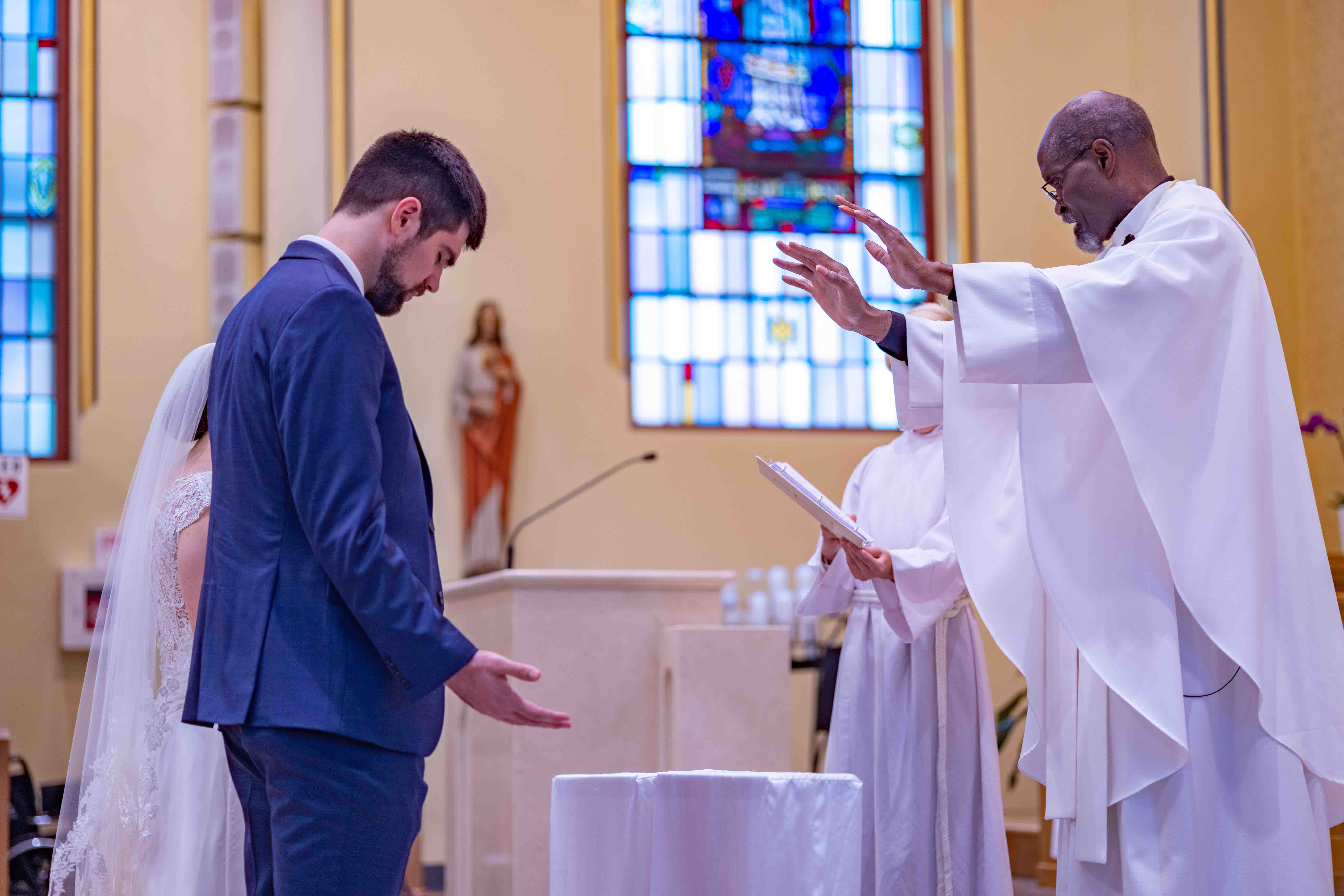
- “Authentic human love is caught up in Divine love” which enriches the marriage, leads the couple to God, strengthens the couple’s unity and aids them in being a good father and mother (cf Gaudium et Spes, 48).
- “Christ is the source of the grace of this sacrament”: Christ dwells with the couple, gives them the strength to take up their crosses and so follow him, to rise again after they have fallen, to forgive one another, to bear one another’s burdens, to “be subject to one another out of reverence for Christ,” and to love one another with supernatural, tender, and fruitful love. In the joys of their love and family life he gives them here on earth a foretaste of the wedding feast of the Lamb” (CCC 1642).
The Goods and Requirements of Conjugal Love
- Conjugal love engages the whole person: the body and instinct, feelings and emotions, and the desires of the spirit and will.
- The Unity and Indissolubility of Marriage:
- Indissolubility: “The love of the spouses requires, of its very nature, the unity and indissolubility of the spouses’ community of persons, which embraces their entire life” (CCC 1644). Day-to-day effort toward being faithful to their marriage promise of total mutual self-giving helps to deepen their unity (cf CCC 1644).
- Unity: Marriage is meant to be undivided and exclusive. Polygamy is contrary to this.
- The Fidelity of Conjugal Love:
- “By its very nature conjugal love requires the inviolable fidelity of the spouses. This is the consequence of the gift of themselves which they make to each other. Love seeks to be definitive; it cannot be an arrangement ‘until further notice.’ The “intimate union of marriage, as a mutual giving of two persons, and the good of the children, demand total fidelity from the spouses and require an unbreakable union between them” (CCC 1646).
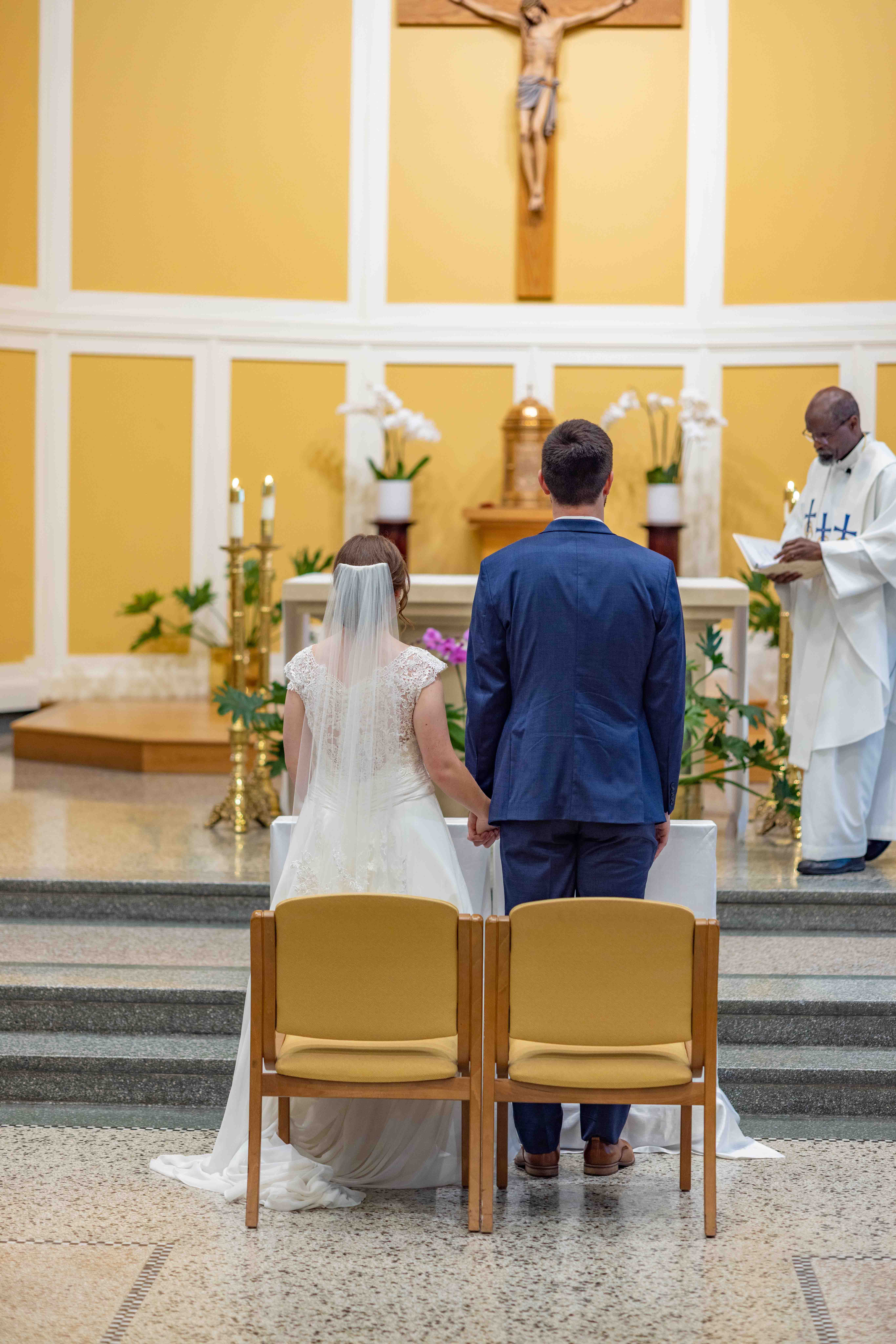
- The couple reflects the fidelity of God to his Covenant which is also expressed in Christ’s faithfulness to the Church.
- “It can seem difficult, even impossible, to bind oneself for life to another human being. This makes it all the more important to proclaim the Good News that God loves us with a definitive and irrevocable love, that married couples share in this love, that it supports and sustains them, and that by their own faithfulness they can be witnesses to God’s faithful love. Spouses who with God’s grace give this witness, often in very difficult conditions, deserve the gratitude and support of the ecclesial community” (CCC 1648).
- In cases where it is impossible for a couple to continue to live together, the Church supports separation. But, the couple is still considered married in the eyes of the Church and cannot remarry unless an annulment of the married is obtained.
- It is contrary to God’s law to divorce one’s spouse and to remarry civilly. This would be to commit adultery because in the eyes of the Church the original couple is still married. Those who divorce and remarry a different person cannot receive the Eucharist. One can still receive the Eucharist if one divorces but remains single. The only way to be able to remarry would be if one’s first marriage is annulled.
- Annulment: This “is an unfortunate word that is sometimes used to refer to a Catholic ‘declaration of nullity.’ Actually, nothing is made null through the process. Rather, a Church tribunal (a Catholic Church court) declares that a marriage thought to be valid according to Church law actually fell short of at least one of the essential elements required for a binding union” (USCCB Website).
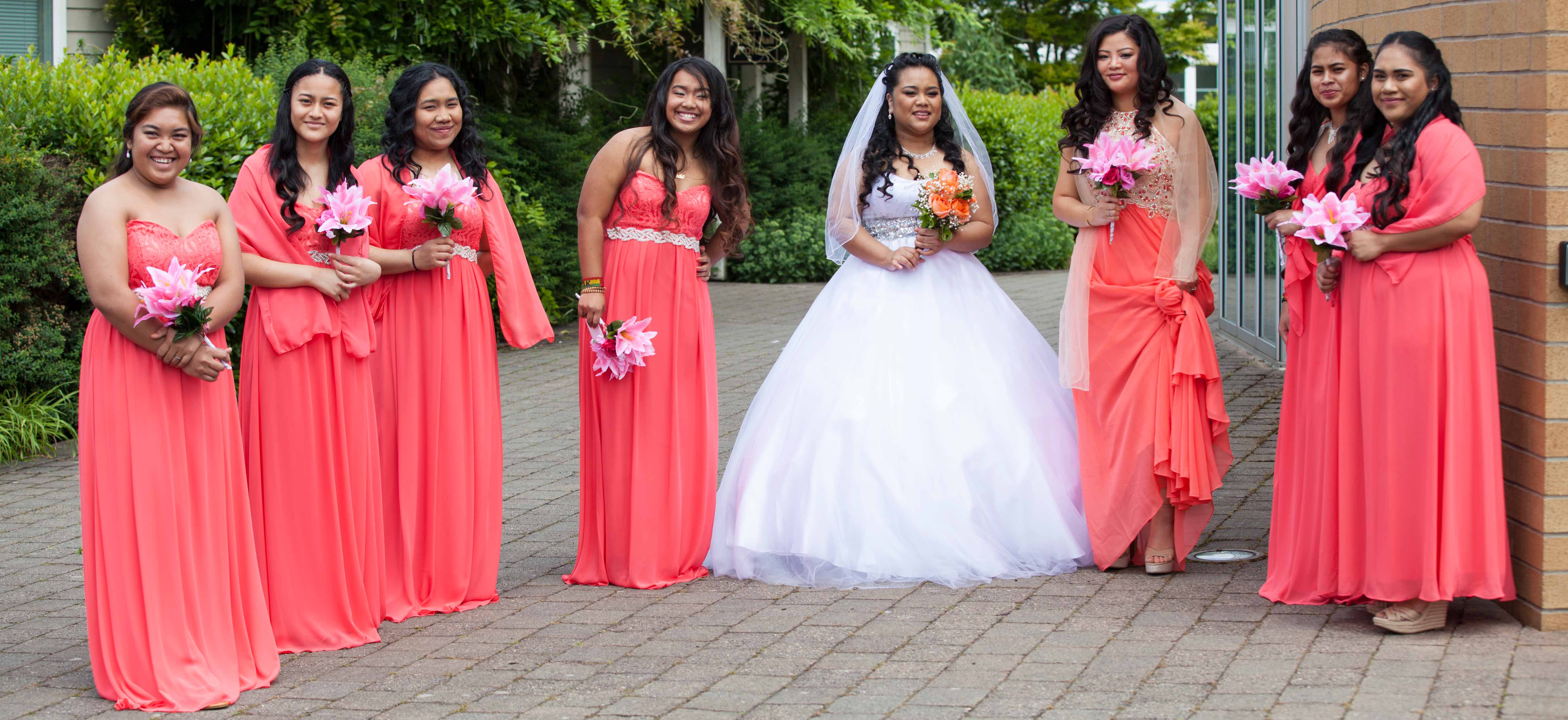
- “By its very nature conjugal love requires the inviolable fidelity of the spouses. This is the consequence of the gift of themselves which they make to each other. Love seeks to be definitive; it cannot be an arrangement ‘until further notice.’ The “intimate union of marriage, as a mutual giving of two persons, and the good of the children, demand total fidelity from the spouses and require an unbreakable union between them” (CCC 1646).
- The Openness to Fertility: “By its very nature the institution of marriage and married love is ordered to the procreation and education of the offspring and it is in them that it finds its crowning glory” (CCC 1652).
- Procreation: In marriage the couple cooperates in God’s work of creation–in bringing about more children in God’s family. Children are a gift and also contribute to the good of the married couple.
- Education: The fruitfulness of married life also includes the fruit of the moral, spiritual and supernatural life that the parents hand on to their children through education (cf CCC 1653).
The Domestic Church
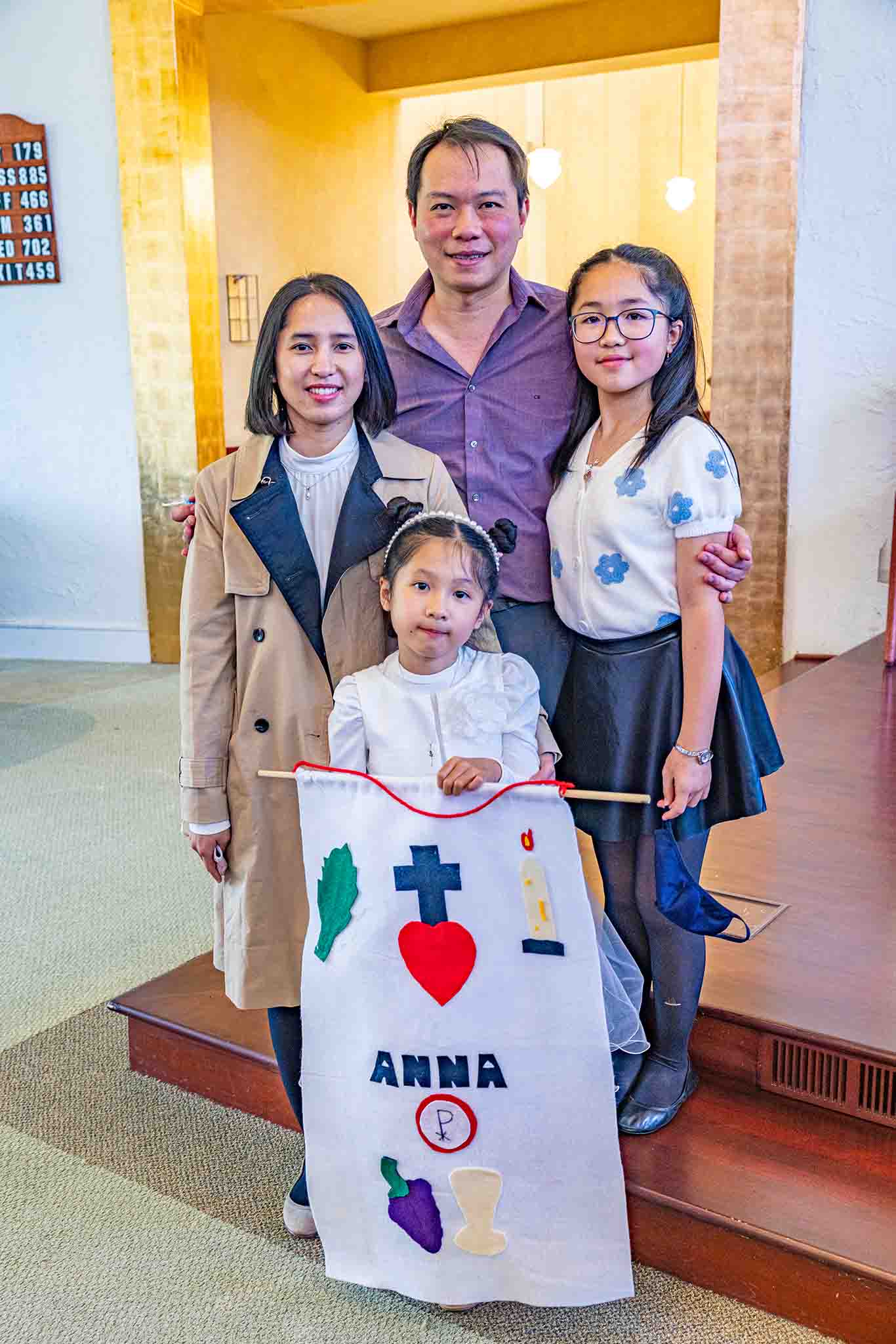
- “The Christian home is the place where children receive the first proclamation of the faith. For this reason the family home is rightly called ‘the domestic church,’ a community of grace and prayer, a school of human virtues and of Christian charity”(CCC 1666).
- “In our own time, in a world often alien and even hostile to faith, believing families are of primary importance as centers ofliving, radiant faith. For this reason the Second Vatican Council, using an ancient expression, calls the family the Ecclesia domestica.168 It is in the bosom of the family that parents are “by word and example . . . the first heralds of the faith with regard to their children. They should encourage them in the vocation which is proper to each child, fostering with special care any religious vocation” (CCC 1656).
